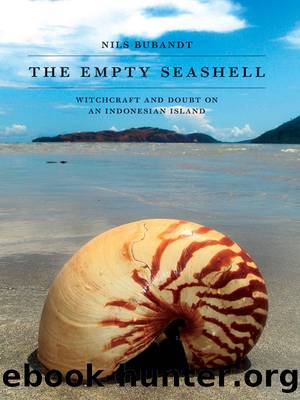The Empty Seashell by Nils Bubandt

Author:Nils Bubandt [Bubandt, Nils]
Language: eng
Format: epub
Tags: Social Science, Anthropology, Cultural & Social, History, Asia, Southeast Asia
ISBN: 9780801471964
Google: U2PkBQAAQBAJ
Publisher: Cornell University Press
Published: 2015-05-06T03:29:51+00:00
New Order Dreams
During the early 1990sâthe heyday of New Order rule, when annual economic growth rates were above 7 percent and criticism of the Suharto governmentâs state cronyism was firmly held in checkâactive state intervention offered a convincing discourse about a new political future as well as a powerful institutional attempt to engineer such a future. Pembangunan or âdevelopmentâ was the shorthand name that people during the 1980s and 1990s had learned to give to this project (Heryanto 1988). It was a name that most people in Buli accepted, even welcomed, less for the benefits it had demonstrably delivered than for the promises of a better future that it held out. The new modern world (I. dunia modern) that development would bring about was one of economic riches, education, public employment, and a sanitized social life. In the early 1990s this project generated particular expectations of modernity in Buli people: dreams about being connected to the electric grid of the PLN generator, which operated from 6:00 p.m. till 12:00 p.m.;3 dreams of corrugated iron on their houses; of a private TV set; of securing a job as a civil servant (I. pegawai) for their children. It was a world in which people, as the state ideology expressed it, had been âbecoming awareâ (I. sadar), a world that entailed a farewell to superstitious beliefs, not just the belief in guardian spirits (suang) but also, centrally, that in sorcery (payao) and in the witch (gua). Through state-engineered progress (I. kemajuan), so it seemed, the gua would finally disappear.
The attempts to weed out witchcraft that characterized the New Order in Buli were built into a robustly modernist belief in centrally organized development, economic improvement, and social engineering. They were also coupled with a cultural arrogance toward the backward beliefs of the marginalized people of the Outer Islands, expressed in the concept of âmental guidanceâ (I. pembinaan mental) (Li 2007:58). âThe law does not acknowledge magic (I. ilmu gaib),â Syamsul Alam, the police chief in Buli, told me in 2004. Pak Syamsul had a BA in law: âThis is a leftover from Dutch Roman law, so the hands of the police are tied. All we can do is to take preventive measures (I. tindakan preventif ) to hinder revenge attack by victims of witchcraft and to provide general guidance (I. pembinaan). Perhaps [things will change], when people become more aware (I. mungkin dengan adanya kesadaran).â
Download
This site does not store any files on its server. We only index and link to content provided by other sites. Please contact the content providers to delete copyright contents if any and email us, we'll remove relevant links or contents immediately.
The Sympathizer by Viet Thanh Nguyen(4385)
The Rape of Nanking by Iris Chang(4203)
World without end by Ken Follett(3474)
Ants Among Elephants by Sujatha Gidla(3463)
Blood and Sand by Alex Von Tunzelmann(3195)
Japanese Design by Patricia J. Graham(3167)
The Queen of Nothing by Holly Black(2587)
City of Djinns: a year in Delhi by William Dalrymple(2554)
Foreign Devils on the Silk Road: The Search for the Lost Treasures of Central Asia by Peter Hopkirk(2463)
India's Ancient Past by R.S. Sharma(2451)
Inglorious Empire by Shashi Tharoor(2437)
Tokyo by Rob Goss(2427)
In Order to Live: A North Korean Girl's Journey to Freedom by Yeonmi Park(2385)
Tokyo Geek's Guide: Manga, Anime, Gaming, Cosplay, Toys, Idols & More - The Ultimate Guide to Japan's Otaku Culture by Simone Gianni(2366)
India's biggest cover-up by Dhar Anuj(2350)
The Great Game: On Secret Service in High Asia by Peter Hopkirk(2344)
Goodbye Madame Butterfly(2250)
Batik by Rudolf Smend(2179)
Living Silence in Burma by Christina Fink(2068)
